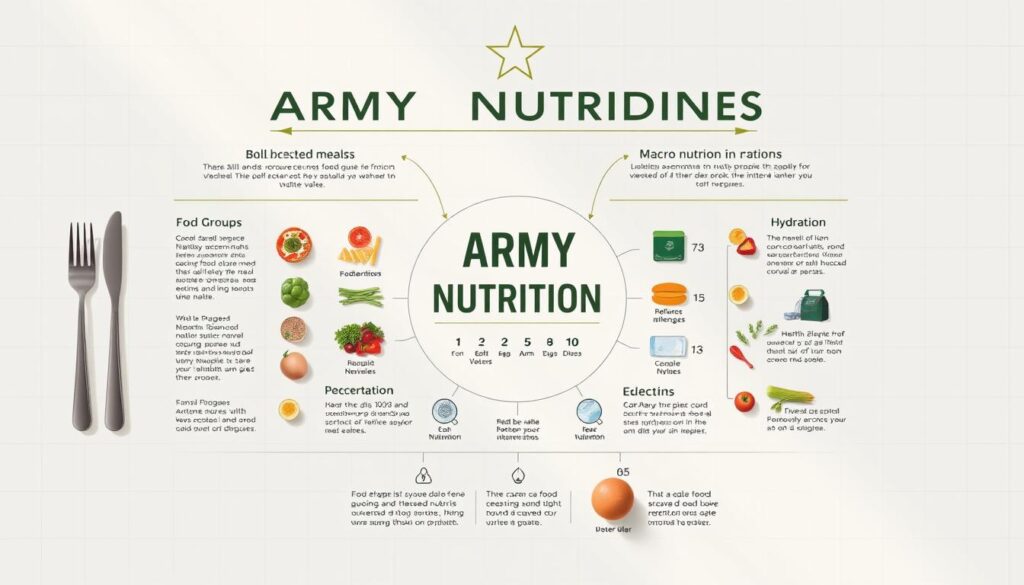Can the right food really make a difference in a soldier’s performance? The answer lies in understanding the importance of proper military diet and its impact on overall health.
The Warfighter’s Guide to Performance Nutrition and Operational Rations emphasizes that “food is your body’s fuel.” This statement highlights the importance of healthy eating tips for soldiers to boost their performance in different environments.
A well-planned diet is key for soldiers to keep their physical and mental health in check. It ensures they can do their jobs well.
Key Takeaways
- Proper nutrition is essential for soldiers’ performance and overall health.
- A well-planned diet helps maintain physical and mental health.
- Understanding macronutrients and micronutrients is vital for optimal nutrition.
- Meal planning is critical for soldiers in various operational environments.
- Special dietary considerations are necessary for soldiers with specific needs.
Understanding Army Nutrition Basics
The nutritional needs of military personnel are complex. They depend on their activity level and mission requirements. Good nutrition is key for soldiers to do their jobs well and stay healthy.
Importance of Nutritional Guidelines
Nutritional guidelines are vital for soldiers. They help ensure soldiers get the right nutrients for performance and health. A leading nutrition expert says,
“Proper nutrition is the foundation of optimal performance and recovery in military personnel.”
These guidelines help create nutrition plans for military personnel that fit their needs.

Key Nutritional Components
A balanced diet for soldiers includes important nutrients. These nutrients help keep energy up, support physical performance, and aid in recovery. The main components are:
- Carbohydrates
- Proteins
- Fats
- Vitamins and Minerals
Each component is crucial for soldiers’ health and performance. For example, carbohydrates are a main energy source. Proteins are key for muscle repair and recovery.
Energy Requirements for Soldiers
Soldiers need different amounts of energy, depending on their activity level. The recommended daily intake ranges from 2100 to 4700 kcal. The Warfighter’s Guide to Performance Nutrition and Operational Rations notes,
‘soldiers have different energy needs based on their activity level.’
This shows the need for personalized balanced meals for army training that match each soldier’s energy needs.
Knowing these energy needs is key for effective dietary recommendations for the military. It makes sure soldiers are fueled right for their tasks, whether it’s intense combat training or other operations.
Macronutrients and Their Role
Soldiers need a balanced mix of macronutrients to stay healthy and perform well. These nutrients are the main energy sources for the body. They are key for both performance and recovery.
Carbohydrates are very important in a soldier’s diet. They are the main fuel for muscles during exercise, as the Warfighter Nutrition Guide points out. They are essential for top performance.
Carbohydrates: Fuel for Performance
Carbohydrates are stored in muscles as glycogen. This glycogen fuels physical activity. It’s important to eat enough carbs to keep glycogen levels up, so soldiers can perform well.
Complex carbohydrates, like whole grains, fruits, and veggies, give long-lasting energy. They are also full of fiber and important nutrients.

Proteins: Building Blocks for Recovery
Proteins are vital for fixing and building tissues, like muscles, bones, and skin. After working out, eating enough protein is key for recovery. It helps fix muscle damage and supports muscle growth.
Soldiers need enough protein to keep their muscles strong and healthy.
Fats: Essential Energy Source
Fats are also crucial, providing energy for long activities. They help with vitamin absorption and keep skin and hair healthy. Healthy fats, found in nuts, seeds, avocados, and olive oil, are important for health.
In short, a balanced diet with carbs, proteins, and fats is vital for soldiers. It helps with performance, recovery, and health. Knowing how these nutrients work can help make better food choices for soldiers and support optimal nutrition for troops.
Micronutrients and Soldier Health
Micronutrients are key for military health and performance. They help with energy, immune function, and physical ability.
Recent studies show that micronutrients are vital for soldiers’ health and performance. Not getting enough can cause poor performance, injuries, and longer recovery times.
Vitamins and Minerals for Optimal Function
Vitamins and minerals are needed for many body functions. For example, Vitamin C boosts the immune system and is found in citrus fruits and greens. Iron helps carry oxygen and is essential for energy.
| Micronutrient | Function | Food Sources |
|---|---|---|
| Vitamin C | Immune function, antioxidant | Citrus fruits, leafy greens |
| Iron | Oxygen transport, energy production | Red meat, beans, fortified cereals |
| Calcium | Bone health, muscle function | Dairy products, leafy greens, fortified foods |
Hydration and Its Impact on Performance
Drinking enough water is crucial for soldiers. Even a little dehydration can hurt physical and mental performance. Soldiers should drink water all day, especially when active.
Following healthy eating tips for soldiers and a balanced nutrition plan for military personnel boosts health and performance. The military’s dietary advice focuses on a varied diet to meet all micronutrient needs.
Meal Planning and Timing Strategies
Good nutrition is key for a soldier’s success. Meal planning is a big part of getting the right nutrients. The Warfighter Nutrition Guide says meal planning and timing are vital for performance and recovery.
Good meal planning looks at a soldier’s training and needs. A balanced diet with carbs, proteins, and fats is needed. This helps keep energy up and supports physical work.
Pre-Exercise Nutrition Guidelines
What you eat before exercise is very important. Eating a meal with carbs and some protein 1-3 hours before helps a lot. For example, whole grain bread, lean turkey, and fruits give lasting energy.
A nutritional expert says, “The timing of when you eat can really affect how well you do in exercise and how you recover.” (
A good meal before exercise can boost endurance and strength.
)
| Nutrient | Pre-Exercise Recommendation | Example Foods |
|---|---|---|
| Carbohydrates | 1-3 hours before exercise | Whole grain bread, fruits |
| Protein | Moderate amount | Lean turkey, eggs |
| Fats | Low amount | Nuts, avocados |
Post-Exercise Recovery Meals
After working out, eating right is key to recover and fix muscles. Eating carbs and protein within 30-60 minutes helps a lot. For example, a banana, protein powder, and almond milk smoothie is great.
For soldiers who don’t meet weight standards, there’s help. Check out this guide for tips and support.
Daily Meal Frequency Recommendations
Eating regularly helps keep energy steady. Soldiers should have 3 main meals and 2-3 snacks in between. This depends on how active they are and their nutritional needs.
By using these meal planning and timing tips, soldiers can do better, recover faster, and stay healthy. It’s about making smart food choices that fit their needs and schedule.
Special Considerations for Different Environments
The impact of environmental conditions on soldier nutrition is key for military success. Soldiers in different environments face unique nutritional challenges. These challenges can affect their performance and health.
Nutrition in Extreme Conditions
Extreme environments, like high temperatures, cold, or high altitudes, raise energy needs. The Warfighter’s Guide to Performance Nutrition and Operational Rations says we need to adjust our nutrition to stay at top performance.
- High-Temperature Environments: Drinking more water is key to avoid dehydration and heat-related illnesses.
- Cold Climates: We might need more calories to keep warm and have enough energy.
- High Altitudes: Adjusting our nutrition can help fight altitude sickness and keep us performing well.
Adapting to Field Conditions
Field conditions often make it hard to keep up with good nutrition. Soldiers must adjust their nutrition plans to fit the resources available. This ensures they get the nutrients they need, despite the challenges.
Key strategies include:
- Eating nutrient-dense foods that give us the energy and nutrients we need.
- Using military rations made to meet soldiers’ nutritional needs in various settings.
- Drinking plenty of water to stay hydrated, especially in extreme conditions.
By understanding and adapting to these challenges, soldiers can keep their health and performance up. They follow Army nutrition guidelines and healthy eating tips for soldiers, even in the toughest conditions.
Nutritional Supplements and Their Use
Understanding the role of nutritional supplements is key for military nutrition. Soldiers face unique challenges due to their training and operations. Supplements help meet their dietary needs.
Common Supplements and Their Benefits
Soldiers use supplements to boost performance, aid in recovery, and support health. Common ones include:
- Protein Powders: Supports muscle repair and growth.
- Creatine: Boosts muscle strength and endurance.
- Branch-Chain Amino Acids (BCAAs): May reduce muscle soreness and fatigue.
- Electrolyte Supplements: Maintains hydration and electrolyte balance, especially in intense training or hot environments.
These supplements are beneficial when used right and with a balanced diet. But, it’s important to remember they should not replace whole foods.
Risks and Considerations
While supplements offer benefits, they also have risks. The Warfighter Nutrition Guide warns about potential dangers, including:
- Contamination with banned substances.
- Interactions with medications or other supplements.
- Overdose or adverse effects from excessive intake.
Soldiers should talk to healthcare professionals before adding supplements. This ensures they are safe and necessary.
| Supplement | Potential Benefits | Risks/Considerations |
|---|---|---|
| Protein Powders | Supports muscle repair and growth | Potential for contamination; ensure reputable brand |
| Creatine | Enhances muscle strength and endurance | May cause stomach cramps, diarrhea; hydrate adequately |
| BCAAs | May reduce muscle soreness and fatigue | Can be expensive; consider dietary sources first |
In conclusion, supplements are valuable for soldiers when used correctly. It’s crucial for military personnel to make informed decisions about supplements to support their health and performance.
Resources for Further Education
For military personnel looking to improve their nutrition, there are many helpful resources. The Warfighter Nutrition Guide is a key tool. It offers detailed Army nutrition guidelines and meal planning tips.
Nutritional Resources and Tools
Military members can find nutrition plans and meal prep guidelines made just for them. These tools help create personalized nutrition plans. They make sure these plans meet Army nutrition standards, helping with performance and recovery.
Professional Guidance
For one-on-one advice, military personnel can talk to registered dietitians or nutritionists who know about military nutrition. They can give specific guidance on meal prep for military members. This helps them reach their nutritional goals.
Using these resources, military personnel can learn more about nutrition. This can improve their overall performance.


